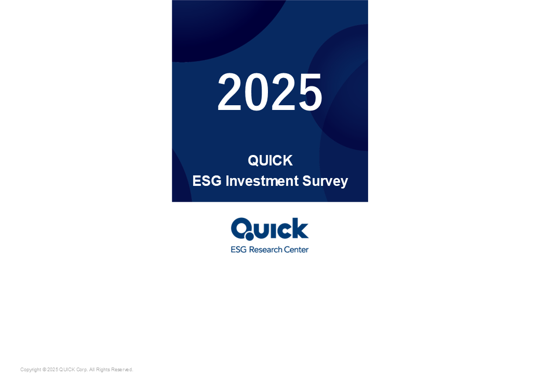Japan Markets View“ESG Investment Survey 2021” Conducted for Institutional Investors in Japan
Feb 17, 2022

[Notable Points]
- “Biodiversity” emerged as the key engagement theme, “Climate change” and “Human rights” on top
- Share of ESG investment in total Japanese stock investments rises to 70%, with over 60% of institutions establishing specialized organizations
- Assessing the value of individual companies, incorporating qualitative aspects such as “Resilience of the business model”
ESG investment, which determines the sustainability and profitability of a company’s business based not only on a company’s financial information but also on information about its environmental (E), social (S) and corporate governance (G) performance, is expanding. QUICK ESG Research Center conducted a survey of various topics, including ESG investment methodologies used by institutional investors, how they combine non-financial information in corporate value assessment, and the emphasized themes of engagement.
[Details of Survey Results]
“Biodiversity” emerged as the key engagement theme, “Climate change” and “Human rights” on top
The top theme of engagement emphasized in FY2021 are “Climate change” (92% of valid responses), followed by “Human rights” and “Diversity and inclusion (respect for diversity)” (both 59%), and “Environmental supply chain” and “Biodiversity” (both 36%). In particular, the theme of “Biodiversity” significantly increased from the previous survey (9%), and was the theme with the largest increase. Policies and initiatives related to mitigating the impact of business on ecosystems, such as sustainable sourcing of raw materials, seem to be gaining attention.
The largest share (50%) of respondents decided to approve or disapprove climate change-related shareholder proposals submitted to Japanese companies in 2020 and 2021 from the perspective of “Comparison with domestic and overseas companies on the status of setting policies and targets for climate change.” It can be seen that they make judgments based on comparisons with Japanese and foreign companies, taking into account the future prospects.
Share of ESG investment in total Japanese stock investments rises to 70%, with over 60% of institutions establishing specialized organizations
ESG investments accounted for 70% of total Japanese stock investments, up from 68% in the previous survey. 22 companies (52%) responded that ESG investments accounted for “90% or more” of their individual company asset balance. As for organizational structure, the most common answer was “There is a department or division dedicated to responsible investment, ESG research, etc.” at 31 companies (63%), up from 25 companies (53%) in the previous survey. With management waving the flag and the organization in place, the trend of increasing ESG investment in Japanese stocks is likely to continue.
As for the issues that need to be included in reporting on responsible investment activities, the most common response was “Medium- to long-term vision for responsible investment” (78%), followed by “Medium- and long-term goals related to the vision” and “Materiality of the company” (both 53%). Institutional investors seem to consider the need to disclose medium- and long-term strategies and goals as an issue.
Assessing the value of individual companies, incorporating qualitative aspects such as “Resilience of the business model”
“ESG integration (systematic and explicit integration of ESG factors into investment analysis and decision-making)” was the most popular ESG investment approach at 87%, followed by “Engagement” (83%) and “Exercise of voting rights” (78%). In the majority of cases, ESG integration was included at the stage of investment evaluation of individual companies, and in only a few cases, at the stage of sector allocation or asset allocation.
As for the integration of information in the evaluation of individual company, the majority responded that they integrate qualitative evaluations regarding environmental and social issues, the top responses being “Resilience of the business model with respect to ES issues, including the status of the supply chain” (65%), “Assessing competitiveness in light of changes in consumer needs and regulations” (63%), and “Provision of ES issue-related solutions and evaluation of R&D capabilities” (53%).
[Survey Overview]
- 157 institutional investors based in Japan which were extracted from institutions that have expressed the acceptance of the “Principles for Responsible Institutional Investors Japan’s Stewardship Code”
- Number of respondents: 53 companies (of which 5 are asset owners and 48 are asset managers)
- Survey period: August 23 to October 19, 2021
The above is a part of the survey result. If you are interested in this survey, please contact us using the inquiry form below.
https://quickmk.smktg.jp/public/application/add/7214




